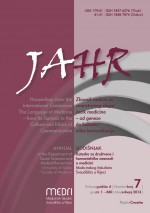Therapeutic communication
Keywords:
therapeutic communication, (non) verbal, doctor, nurse, patientAbstract
This article focuses on the concept of "Therapeutic communication". it also tries to highlight the importance of this concept, which through verbal or nonverbal communication makes the nurse consciously influence a client or help the client. it involves the use of specific strate-gies that encourage the patient to express feelings and ideas. There are different reactions to "therapeutic communication" as all patients differ in their characters, background, social status, culture, etc. This article will also compare the role of the nurse as compared to that of the doctor. They must both master efficient therapeutic techniques of communication in order to establish empathy towards the experience that the patient reveals. it is of great importance for them to have communicative therapeutic skills in order to successfully apply the communicative process as well as to fulfil the standards of healthcare for the patients. Through therapeutic communication they should establish a relationship, identify the patients’ worries and needs, estimate the perceptions of the patient including detailed actions (behaviour, messages) etc. Results and recommendations will include a comparison between different techniques of therapeutic communication based on different experts such as Knapp and Hall, de vito etc.
Downloads
Published
Issue
Section
License
Authors who publish with this journal agree to the following terms:
- Authors retain copyright and grant the journal right of first publication with the work simultaneously licensed under a Creative Commons Attribution License that allows others to share the work with an acknowledgement of the work's authorship and initial publication in this journal.
- Authors are able to enter into separate, additional contractual arrangements for the non-exclusive distribution of the journal's published version of the work (e.g., post it to an institutional repository or publish it in a book), with an acknowledgement of its initial publication in this journal.
- Authors are permitted and encouraged to post their work online (e.g., in institutional repositories or on their website) prior to and during the submission process, as it can lead to productive exchanges, as well as earlier and greater citation of published work (See The Effect of Open Access).



